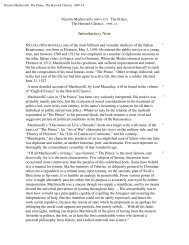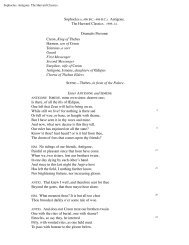Notre Dame de Paris - Bartleby.com
Notre Dame de Paris - Bartleby.com
Notre Dame de Paris - Bartleby.com
You also want an ePaper? Increase the reach of your titles
YUMPU automatically turns print PDFs into web optimized ePapers that Google loves.
firmly seated than when it has no sort of reason.<br />
Assuredly Esmeralda could not think of the captain without pain. Assuredly it was dreadful that he too<br />
should have been <strong>de</strong>ceived, should have believed it possible that the dagger-thrust had been <strong>de</strong>alt by her<br />
who would have given a thousand lives for him. And yet he was not so much to blame, for had she not<br />
confessed her crime? Had she not yiel<strong>de</strong>d, weak woman that she was, to the torture? The fault was hers,<br />
and hers alone. She ought rather to have let them tear the nails from her feet than such an avowal from<br />
her lips. Still, could she but see Phœbus once again, for a single minute, it nee<strong>de</strong>d but a word, a look, to<br />
un<strong>de</strong>ceive him, to bring him back to her. She did not doubt it for a moment. She closed her eyes to the<br />
meaning of various singular things, or put a plausible construction on them: the chance presence of<br />
Phœbus on the day of her penance, the lady who stood besi<strong>de</strong> him—his sister, no doubt. The explanation<br />
was most unlikely, but she contented herself with it because she wished to believe that Phœbus still loved<br />
her, and her alone. Had he not sworn it to her? And what more did she need—simple and credulous<br />
creature that she was? Besi<strong>de</strong>s, throughout the whole affair, were not appearances far more strongly<br />
against her than against him? So she waited—she hoped.<br />
Ad<strong>de</strong>d to this, the church itself, the vast edifice wrapping her round on all si<strong>de</strong>s, protecting, saving her,<br />
was a sovereign balm. The solemn lines of its architecture, the religious attitu<strong>de</strong> of all the objects by<br />
which the girl was surroun<strong>de</strong>d, the serene and pious thoughts that breathed, so to speak, from every pore<br />
of these venerable stones, acted upon her unceasingly. Sounds arose from it, too, of such blessedness and<br />
such majesty that they soothed that tortured spirit. The monotonous chants of the priests and the<br />
responses of the people—sometimes an inarticulate murmur, sometimes a roll of thun<strong>de</strong>r; the<br />
harmonious trembling of the windows, the blast of the organ like a hive of enormous bees, that entire<br />
orchestra with its gigantic gamut ascending and <strong>de</strong>scending incessantly—from the voice of the multitu<strong>de</strong><br />
to that of a single bell—<strong>de</strong>a<strong>de</strong>ned her memory, her imagination, her pain. The bells in especial lulled<br />
her. A potent magnetism flowed from the vast metal domes and rocked her on its waves.<br />
Thus, each succeeding morn found her calmer, less pale, breathing more freely. And as the wounds of<br />
her spirit healed, her outward grace and beauty bloomed forth again, but richer, more <strong>com</strong>posed. Her<br />
former character also returned—something even of her gaiety, her pretty pout, her love for her goat, her<br />
pleasure in singing, her <strong>de</strong>licate mo<strong>de</strong>sty. She was careful to retire into the most seclu<strong>de</strong>d corner of her<br />
cell when dressing in the mornings, less some one from the neighbouring attics should see her through<br />
the little window.<br />
When her dreams of Phœbus left her the leisure, the gipsy sometimes let her thoughts stray to<br />
Quasimodo—the only link, the only means of <strong>com</strong>munication with mankind, with life, that remained to<br />
her. Hapless creature! she was more cut off from the world than Quasimodo himself. She knew not what<br />
to think of the singular friend whom chance had given her. She often reproached herself that hers was<br />
not the gratitu<strong>de</strong> that could veil her eyes, but it was useless—she could not accustom herself to the poor<br />
bell-ringer. He was too repulsive.<br />
She had left the whistle he gave her lying on the ground; which, however, did not prevent Quasimodo<br />
from appearing from time to time during the first days. She did her very utmost not to turn away in<br />
disgust when he brought her the basket of provisions and the pitcher of water, but he instantly perceived<br />
the slightest motion of the kind, and hastened sorrowfully away.<br />
Once he happened to <strong>com</strong>e at the moment she was caressing Djali. He stood a few minutes pensively<br />
contemplating the charming group, and at last said, shaking his heavy, misshapen head:










